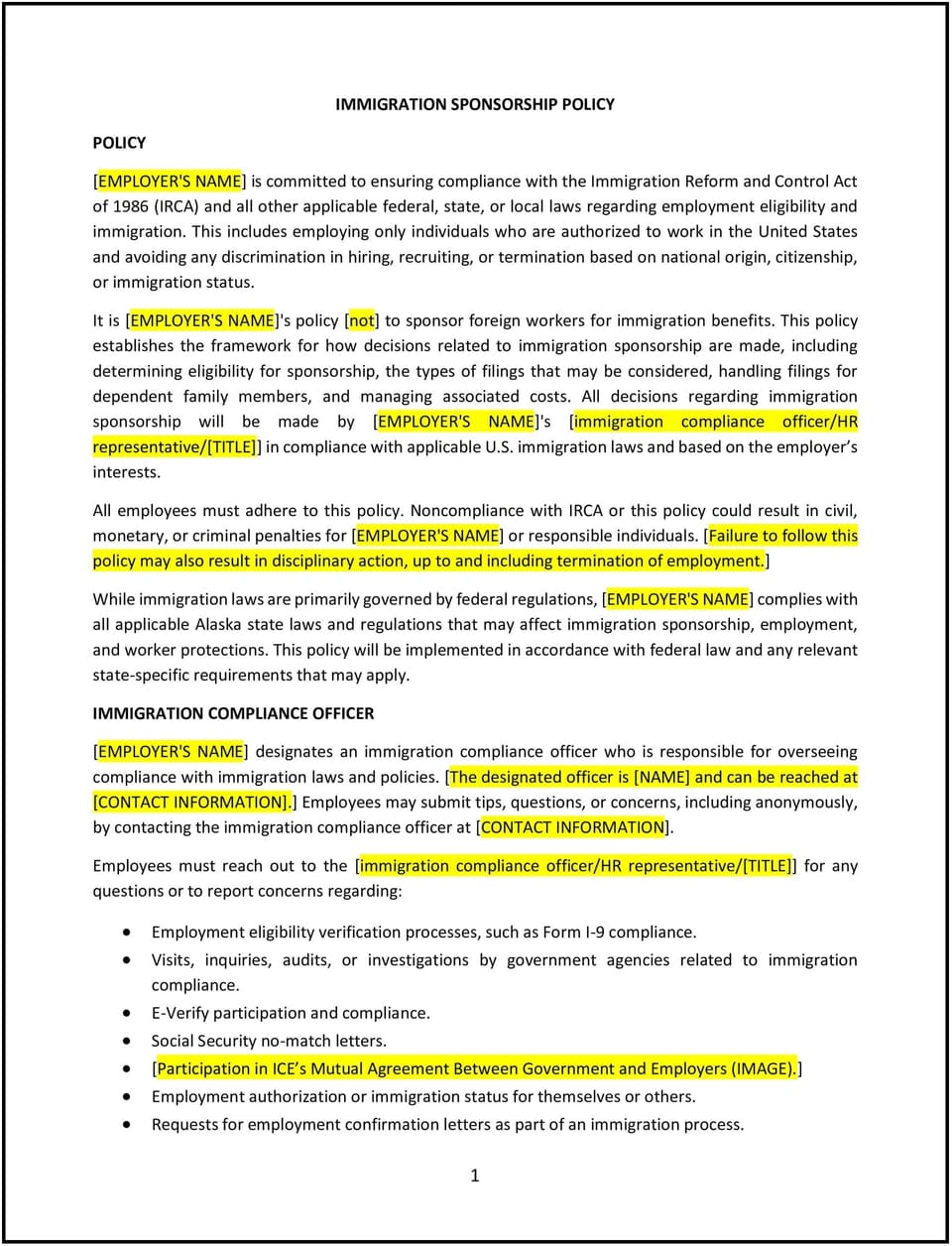Immigration sponsorship policy (Alaska): Free template

Immigration sponsorship policy (Alaska)
In Alaska, an immigration sponsorship policy provides clear guidelines for supporting employees who require work authorization or visa sponsorship to work in the United States. This policy outlines the company’s approach to sponsoring employees for immigration benefits, ensuring compliance with legal requirements while fostering a diverse and inclusive workforce. By implementing this policy, businesses can attract top talent, support employee retention, and navigate the complexities of immigration processes.
Given Alaska’s unique workforce needs and challenges, such as seasonal industries and remote operations, businesses may tailor their policies to address specific local considerations.
How to use this immigration sponsorship policy (Alaska)
- Define eligibility: Specify the roles or positions eligible for immigration sponsorship, such as those requiring specialized skills or hard-to-fill roles.
- Outline sponsorship process: Provide clear steps for initiating and completing the sponsorship process, including documentation, legal fees, and timelines.
- Address responsibilities: Clarify the responsibilities of both the company and the sponsored employee, such as covering legal costs or maintaining visa status.
- Include compliance measures: Emphasize adherence to federal and state immigration laws to avoid penalties or non-compliance risks.
- Communicate expectations: Ensure employees understand the policy by discussing it during onboarding or when a sponsorship request arises.
Benefits of using an immigration sponsorship policy (Alaska)
An immigration sponsorship policy provides significant advantages for businesses in Alaska. Here’s how it helps:
- Attracts top talent: Enables businesses to recruit skilled workers from a broader talent pool, including international candidates.
- Supports compliance: Helps businesses navigate complex immigration regulations, reducing legal risks and ensuring adherence to federal requirements.
- Enhances diversity: Promotes a multicultural workforce, enriching the company’s culture and fostering innovation.
- Improves retention: Demonstrates a commitment to supporting employees’ immigration needs, enhancing loyalty and long-term engagement.
- Provides clarity: Offers employees and managers clear guidance on the sponsorship process, minimizing misunderstandings or delays.
Tips for using an immigration sponsorship policy (Alaska)
- Tailor to local needs: Address specific workforce challenges in Alaska, such as seasonal work or hard-to-fill roles in remote locations.
- Collaborate with legal experts: Work with immigration attorneys to ensure all processes comply with federal and state laws.
- Monitor visa status: Implement a system to track visa expiration dates and renewals to avoid disruptions in employment or legal violations.
- Provide support: Offer resources to help sponsored employees and their families navigate immigration-related challenges, such as housing or relocation assistance.
- Update regularly: Revise the policy to reflect changes in immigration laws, workforce needs, or organizational priorities.
Q: Which positions are eligible for immigration sponsorship under this policy?
A: Positions requiring specialized skills, hard-to-fill roles, or those critical to business operations are typically eligible for sponsorship. The policy should specify criteria.
Q: What costs are covered by the company during the sponsorship process?
A: The company usually covers legal fees and filing costs associated with sponsorship, but specific arrangements should be outlined in the policy.
Q: How should employees request sponsorship?
A: Employees or candidates should discuss their needs with HR or a designated immigration liaison, who will guide them through the request and application process.
Q: What are the employee’s responsibilities under this policy?
A: Employees must provide accurate documentation, comply with visa requirements, and communicate any changes in their immigration status promptly.
Q: How often should this policy be reviewed?
A: The policy should be reviewed annually or whenever significant changes occur in immigration laws, business needs, or workforce demographics.
This article contains general legal information and does not contain legal advice. Cobrief is not a law firm or a substitute for an attorney or law firm. The law is complex and changes often. For legal advice, please ask a lawyer.


